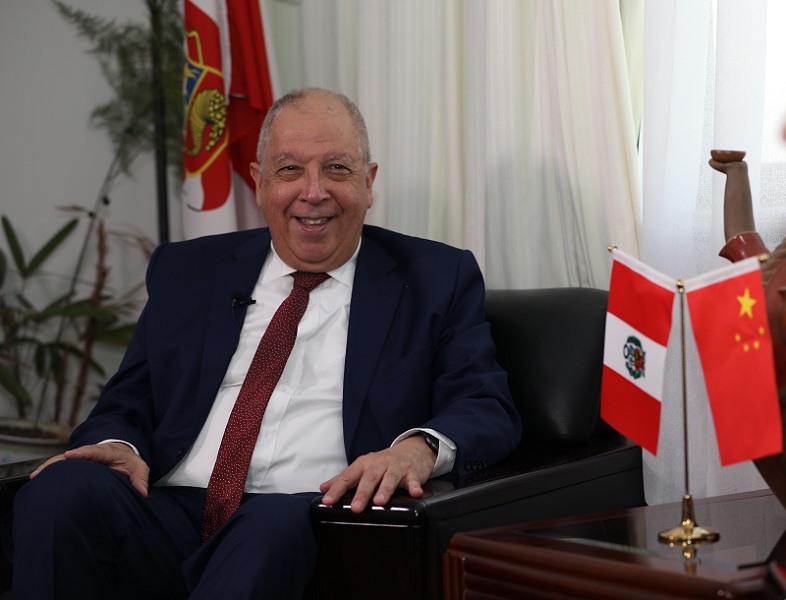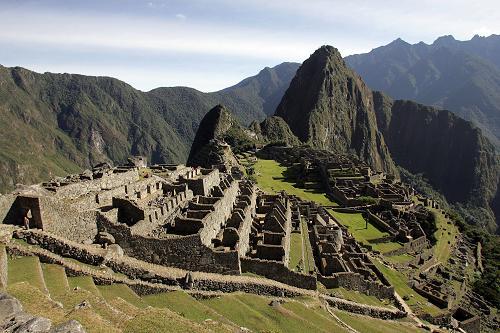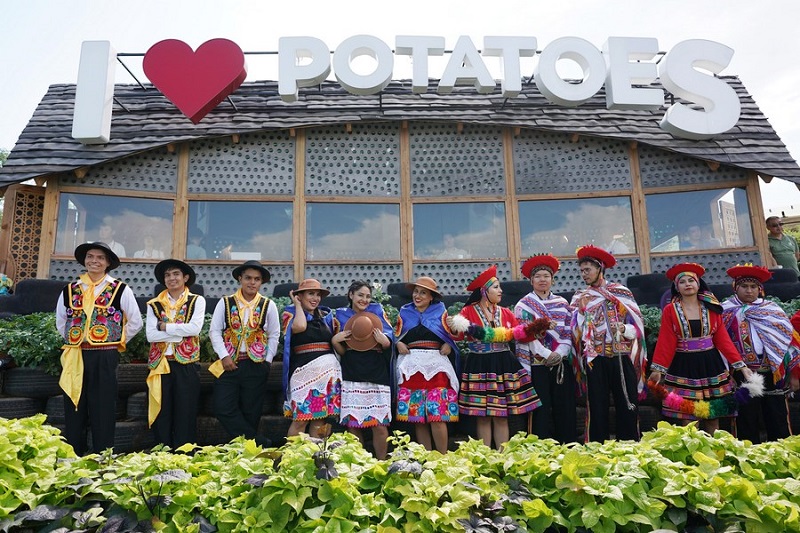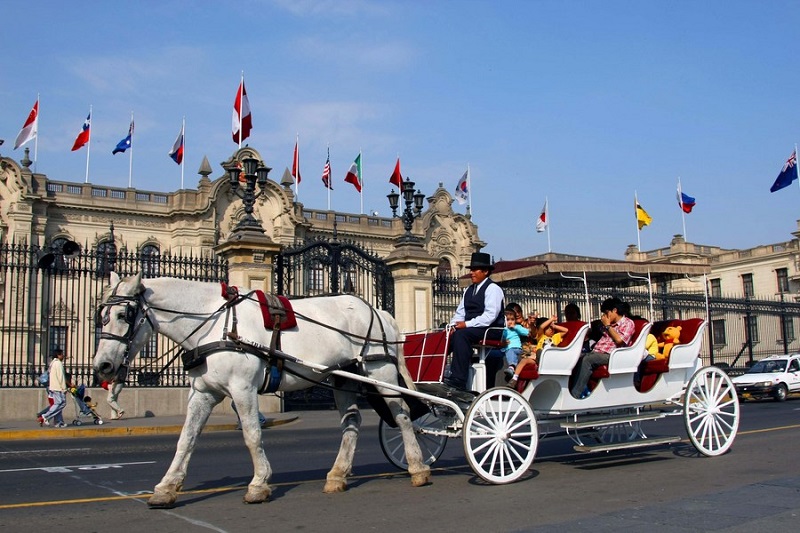Editor’s Note: Peru is one of the major destinations for Chinese investment in Latin America, and also the country with the largest number of Chinese living in Latin America. Luis Quesada, Ambassador of Peru to China shares his experience and insights into China-Peru relations in an interview with Ms. Sun Chao, the author of “Global Leaders on the Belt and Road Initiative”. Authorized by Sun Chao, the excerpts of the interview are published by China Focus.
Riding a bicycle in Beijing
Sun Chao: Dear Mr. Ambassador, thank you so much for joining our Ambassador Interview. I know you have long deep relations with China. Once you said that life in China is not boring at all. How is your life in China?
Luis Quesada: I like to observe society. I enjoy the time when I ride my bike and look at other people in the street. Of course, China is a country with beautiful landscapes and wonderful cultural heritage sites, and many other fantastic things. For instance, I find it so interesting and charming to go to the Chaoyang Park to see the families walking around. You could realize the links that the Chinese people have between their families and friends, and I like that.
Sun Chao: Would you like to share the most unforgettable stories in China?
Luis Quesada: I think my whole period in China will be unforgettable. In fact, I have been here several times, so I have been able to see the progress of the country throughout the years, either as a tourist, or as a Peruvian diplomat. Every time when I was coming, especially to Beijing and Shanghai, which are the Chinese cities I have visited more throughout my life, I could see the advance and the progress, the well-being of the people.
I first came to China in 1983, about 40 years ago. China was a country that was always lingered over my imagination from different resources like the culture, the history, and the society at that time. So, I wanted to come here. My friend and I went around Beijing on bicycles instead of tour buses. And touring the city with my bicycle was the first time that I had a connection with the Chinese people, even just asking them for directions.
I knew they could not speak English but we could also communicate with eyes, hands, and other things. Once upon a time, I had only one flat tire. So I found a workshop. There were many workshops at that time because everybody in the street was on a bicycle. It was an exceedingly interesting interaction with the hands and eyes, for example, asked for repairing like “how much do I owe you”. Therefore, there was a good connection with Chinese people.

Luis Quesada, Ambassador of Peru to China
Sun Chao: I know this year you have spent your third Spring Festival in Beijing. How did you plan to celebrate the holiday?
Luis Quesada: We, many other Peruvians and I, enjoy Spring Festival and Jiaozi very much. We also enjoy very much all sorts of Chinese food. The reason is that, historically, China had a very strong influence in Peru because of the immigration 170 years ago of Chinese, especially mostly from Guangdong and Fujian province. Therefore, we are more accustomed to this kind of specialty than the northern.
You could enjoy the food from Sichuan, Wuhan, and anywhere if you live in Beijing, a very cosmopolitan city. But when you travel, it’s nice to try the food in every province. The hospitality of Chinese people is great. Whenever I travel, it’s always the local authorities and friends who invite me to a very special meal with other fantastic things which is worthy to have a try.
The Leadership of China
Sun Chao: Mr. Ambassador, What do you see the development of China and the role of the leadership?
Luis Quesada: The CPC [Communist Party of China] has been quite essential for contemporary China if you see the history from the start. The CPC delivered stability to the country. It is universally acknowledged that it was not an easy road with many formidable challenges along the way.
My first duty as a diplomat is to respect the political structure, the political life of the country. China is now a prosperous country and is very willing to give help to the others. So, there are big merits in the leadership of the party to have achieved all of these objectives, of which the alleviation of poverty was the main one. The alleviation of poverty has achieved a dramatic change in this country and many of the remarkable things that have been known worldwide, which could serve as an inspiration to other societies, according to the differences of every society.
China has set exceedingly significant examples in general. This is because so many objectives have been achieved in such a short time. In the last forty years, China has achieved a number of objectives while other countries did that in 100 or even 200 years. So the fact is that China has always been a power, and it’s an economic and technological power now. All of these things define what means to be a leader in the world. So there is no doubt that we all want China to continue exercising responsible leadership, especially during these difficult times when we need cooperation and when we see that globalization has confronted recently with so many obstacles. Therefore, all of us look forward to seeing not only how China is doing now, but how China is going to promote itself in the future.
Second destination for Chinese investment in Latin America
Sun Chao: 2022 marks the 51st anniversary of bilateral relations between our two countries. What are your expectations for our future?
Luis Quesada: Peru was the second country in South America to establish diplomatic links with the People’s Republic of China. And the relations between our countries have developed all the time to reach the next level. Of course, we bear in mind that we have some difficulties because the pandemic is not over yet. I think the highlight of our celebration last year was a greatly significant exhibition of the arts for Peru’s civilization in the Capital Museum. The exhibition went to Taiyuan, then went to Tianjin, Chongqing, Changsha, Guangzhou and finally Beijing.
In the framework of the exhibition, we would have seminars for different publics. We would also have celebrations in Peru as well. Over the past fifty years, it has been a long way but very fruitful, because now China is our first trade partner. So, there’s a trade volume between China and Peru for almost $24 billion. Now Peru has become the second destination for Chinese investment in Latin America.

General view of the Inca citadel of Machu Picchu in 2007. (Photo/Xinhua)
Many of the investment is in mining, and China is our second investor in mining. But now, China has invested in energy as well, like oil. But the most important thing is that we have a very strong economic relationship based on a free trade agreement that was signed in 2009 and went into effect from 2010, which plays a crucial role in the increment of our trade. We were exporting more sufficient products to China, but now our consumer products are finding a very good acceptance in Chinese public, mainly avocados, blueberries, asparagus and grapes, which is growing and growing. Meanwhile, we need to update it because trade is an evolving process and always entails to update the cooperation. Now we have e-commerce and other areas that require us to legislate together. So, our teams, from the ministry of commerce to ministry of trade, are negotiating to find common ways so that we have our FDA updated together.
E-commerce, intellectual property, and market access would be the major sectors because all the conditions of these areas invariably change with time. Now many of the products are produced worldwide. If you have one product, you produce one piece in this country, and one piece in another. So we have to also be more accurate on that and more technically interested in the fact that the spirit of the agreement is there, there are just some segments that we have to adjust.
Sun Chao: Mr. Ambassador, What’s your point of view on the Belt and Road Initiative and globalization for a new era?
Luis Quesada: We are very happy to be alongside China in the Belt and Road Initiative (BRI). We’re very much interested in the areas of the Initiative, especially the infrastructure, serving as our priority to work with China. In this area, we do have a gap. So we would like to attract more Chinese companies and projects in that area. And we were happy to sign the memorandum of understanding in 2019. Until now, we have two pivotal projects with China: the one is an investment, mainly in energy, and the other one is that we are constructing a huge mega port with COSCO SHIPPING so that it will be a hub for the South Pacific in our side of the world. So that is an example of how cooperation can be done between our two countries. Moreover, there are also many initiatives that have come out of the Belt and Road today, like the digital roads, the area of intelligence, the technologies for communications, and so on.
China is also interested in building up the railways in Peru. There are already companies engaging in building roads and they have been very successful.
We had 170 Chinese companies in Peru. The Chinese businessmen don’t feel alone because they find that there is a really Chinese business community in Peru, and also with the given fact that 8 percent of Peruvians have a Chinese background. So, there are a lot of companies, not only Peruvian companies and Chinese companies but also the companies of Peruvian and Chinese background in Peru. In fact, they are in a country that has had and is having a very tough time with the pandemics. But it’s still a country with a sound economy, macro-economically and financially, from the point of view of the International Monetary Fund (IMF), and it’s very well advanced in Peru.
Potatoes for poverty alleviation
Sun Chao: Would you please share more things on poverty alleviation in Peru?
Luis Quesada: Interestingly, the process of poverty alleviation between our countries has some basic points, even though they have differences. We did it by promoting our economy, reuniting some segments of our financial sector, and opening up the door for more activities from the private sector. All these factors made sense.
Our reforms started at the beginning of the 1990s, so we have around 30 years of reform. And unfortunately, the lockdown on the situation for the pandemic probably is going to halt this progress for a while. But some institutions like the International Monetary Fund say that Peru will be the country that will recover better in Latin America. Peru does have a sound economic infrastructure. We just started 30 years ago, so we have a very strong economy with a strong financial sector and central bank as well as a very vibrant private sector. Without being modest, I have to say that Peru’s workforce is very good and we are hardworking people. So it’s a good combination of everything.
The situation that takes advantage of potatoes to help fight against poverty had happened everywhere in the world, but the potato was stable that has thousands of years in Peru. Potato has contributed a lot to the world, but it’s emblematic for us.

Artists prepare to perform during the “International Potato Center and Peru Joint Honorary Day” theme event held as part of the Beijing International Horticultural Exhibition in Yanqing District in Beijing, capital of China, Sept. 1, 2019. (Photo/Xinhua)
We have been greatly active in international mutation with the proportion of the potato. At the recent, the problems of food safety and security are very pivotal. We have established the International Potato Center in Peru, the Centro International de la Papa, which aims to scientific mutation of the potato. And it has worked very closely with Chinese scientists, for instance, there is also a small section of the institute in Beijing recently. They have also developed new sorts of potatoes like CADA, the product of a project in Yunnan province. I’m so happy that our institute could contribute to the alleviation of poverty in China. Besides, it was displayed in the heritage culture exhibition in 2019, showing the Chinese public the importance of the potato in the links between China and Peru.
Unique Peru
Sun Chao: When the Chinese people talk about your country, what would you want them to know or to remember?
Luis Quesada: We are also a country of a very ancient civilization like China, a 5000-year more or less history. Definitely, we are two very different countries. But anyhow, until 2019, we had about 40,000 Chinese visitors, most of whom went to visit our historical sites and ancient cities. So there is a general interest in China for ancient culture. And an important element that unites us is gastronomy. Chinese like it as well as we do. You have very good tools, and so do we. Moreover, most of the Chinese that visit Peru also enjoy nature. So, for the potential Chinese visitors, Peru is not only a land of colorful culture and magnificent history, but it’s also a land of beautiful landscapes and biodiversity. We have most of the climates in the world and we are not a big country, so if you can travel from one side to the other side, you would admire the change of environment, like the flora and fauna. In one word, it’s worth traveling to Peru.
Sun Chao: Mr. Ambassador, how would you like to attract more Chinese tourists to visit Peru?
Luis Quesada: Our country is unique, On the one hand, Peru is endowed with a blending of different cultures. Because the indigenous Peruvians have been there in what is now land for thousands of years. Then we have experienced so many changes. The arrival of the Europeans, like the Spanish had lasted for 300 years. At the same time, the Africans also came to the country, unfortunately, as slaves, brought by the Europeans. Then we had the Asian immigration, like Chinese and Japanese, and then people from other European countries. So officially, it’s a mixture of cultures that makes our society very interesting and attractive.
On the other hand, Peru is not a big country but it is endowed with a breathtaking desert coast and majestic mountains like the Andes, with the incomparable beauty of valleys and canyons, and marvelous cities that reflect this fusion of cultures. Peru also possesses the jungle, which is a wonderful example of biodiversity, with all kinds of animals and plants. Besides, gastronomy is superb because of the fusion of cultures.

A carriage taking tourists passes by the presidential palace at the Plaza Mayor of Lima, capital of Peru, Nov. 15, 2008. (Photo/Xinhua)
Moreover, Peruvians are really hospitable and friendly while not all societies are like that. And the Chinese will find it really rewarding to have such a wide people-to-people connection and they would be warmly received in Peru. Of course, we need to do more. For example, because Chinese tourists are also full in expectation for Peru, our hotels are also trying to accommodate the needs of the Chinese. Basically, in the last years, we have done a lot. I am not shy about inviting Chinese people to connect with us because we are very active in all social networks when we promote our country.
Sun Chao: Peru is the country with the largest number of Chinese descents in the region. Would you please send some messages to Chinese people in your country?
Luis Quesada: Peruvians of Chinese ancestors make up between eight and ten percent of Peru’s population. As for the message I should give them, I am surely confident that they should feel very proud of their Chinese heritage. The fact is that their families have struggled since their arrival to Peru and now that they are prosperous that they combine the Chinese values with Peruvian values. They have shown a way for the people, a great example, to be optimistic and to have had such a big promise in our society. Therefore, my country and I like to express congratulations.
Sun Chao: As a routine of the program, would you like to share one motto from Peru?
Luis Quesada: When we are children attending the school, and the teachers, as it happens here, teach us to feel proud of the history of our country. And they always tell us a motto from the time of the Incas, the empire that existed before the Spanish arrived: Don’t lie, don’t be lazy, and don’t steal. Although it sounds too considerable and moral, it is a very important value in life because it resonates and comes through that time.
I just want to say that I live happily in China. I’ll always remember my years here. I enjoy living here. I still think that there are so many things I haven’t seen yet. My biggest fear is that when I go back, I will say to myself “Oh, I didn’t see this, and I didn’t see that.” Because this country is so immense, and there are so many things I can do. Even in Beijing, I’m trying to go here and there with my bike, the same things as I did in 1983.
I like to discover new things, like old and new streets and neighborhoods. As I always say, I think that even though you can live 50 years in China, you will always get interested in it, because there are so many things.